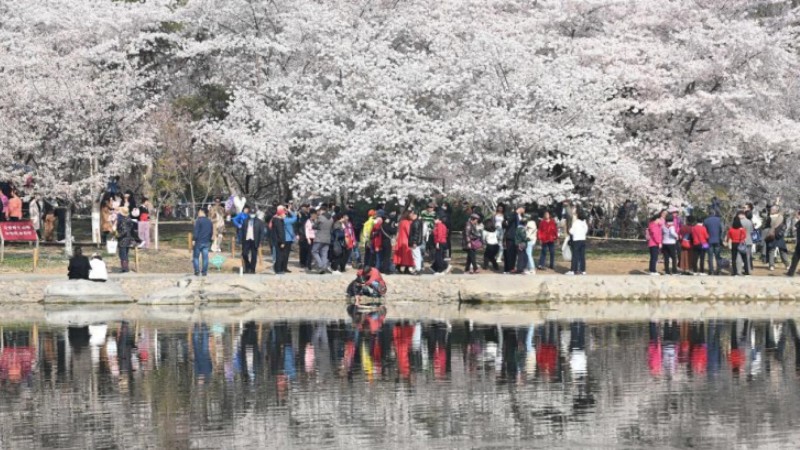More Chinese take the sting out of inheritance with wills
YINCHUAN, April 4 (Xinhua) -- The annual Qingming Festival, also known as Tomb-Sweeping Day, is a traditional occasion on which Chinese people remember the dead. The occasion, which falls on Wednesday this year, causes those still on this earthly plane to reflect more deeply on life and death.
Xu Fang, 43, is well aware of this peak period for death-related pondering, working as she does at the public notary agency in Yinchuan, the capital city of northwest China's Ningxia Hui Autonomous Region. In the run-up to the festival, she has been busy dealing with queries from citizens keen to make their wills or looking for information on the topic.
"There is a significant rise in the number of phone calls and face-to-face consultations. Some demands are quite urgent as the applicants are aged or even in a critical health condition," said Xu.
During the peak season for making wills, the agency also provides door-to-door services at lunch breaks or weekends.
Over the past two decades as a notary, Xu has served people from different age groups and in different states of health. She clearly recalls one old lady who passed away just three days after Xu's visit earlier this year.
"It's more like a responsibility than just a job. We strive to ensure that people can depart this world in peace, rather than full of regrets," Xu added.
Death, an eternal topic for human beings in both art and daily life, was once a taboo subject for public discussion in China. However, thanks to China's rapid social and economic development, which has boosted the education and wealth of its population, more people are willing to openly discuss the issues surrounding inheritance.
Meanwhile, the country has made unremitting efforts to further promote improvements to its legal system in a bid to better protect people's legitimate rights and interests, especially through the Civil Code, which took effect on Jan. 1, 2021.
"Inheritance is mentioned in the Civil Code. People believe that the assets arranged in their will are protected by the law," said Chen Kai with the China Will Registration Center, a social service agency providing professional services for will registration. The center now has over 60 sub-agencies across China.
According to Chen, the past decade has witnessed a growing number of testators, and their average age has declined from 77.43 to 68.13 years old. Even the millennials are joining the trend, making wills for their virtual property, such as virtual currencies and online gaming accounts.
"Who knows what will come first -- tomorrow or the unexpected. That's probably what I heard most from the young testators who are currently in good health," said Zhang Wenjuan, a colleague of Xu.
She added that, in making their own wills, the youngsters often want to express their own personal choices and protect their own rights.
About two years ago, a female testator in her forties wrote her will at the China Will Registration Center, deciding to leave all her wealth, including an apartment, to her beloved nieces.
"Before I made this will, I was anxious about my possible future guardian. Now I feel reassured, as I can protect my loved ones from potential property disputes," said the testator surnamed Wang.
Chen, also a senior lawyer, agrees with the testator on that point. Official data collected by China Judgements Online shows that, of the approximately 6,000 cases concerning bequest disputation in 2022, those cases involving wills made by the deceased accounted for less than 12 percent.
"The will is not just a piece of paper, but is a legal document able to pass on love and care to your family," said Chen. Making wills plays an increasingly important role in easing the judicial burden and maintaining the peace and harmony of family and society, he added.
For some people, the process of making wills prompts them to re-examine the meaning of their lives.
"I couldn't stop crying as I was writing down my final words to my family members. All of a sudden, I felt relieved, and realized that death is not terrible. What is terrible is losing one's passion and awe towards life," said a 35-year-old testator.
Xu foresees a huge demand for making wills in the country, and yet some people still lack the necessary legal knowledge and access. She has started to visit communities and villages with her colleagues on a weekly basis, promoting the relevant legal knowledge.
"We offer free notarization of wills for those aged over 80, aiming to helping more people in need, and allowing the warmth of law and justice to shine on them," Xu said.
Photos
Related Stories
- People pay tribute to deceased on Tomb-sweeping Day across China
- People across China enjoy spring view during Qingming Festival
- COVID-19 weighs down tourism during Qingming Festival
- Calendar for Chinese 24 Solar Terms: Qingming
- Qingming, time for remembering heroes and observing traditions
- Qingming, time for remembering heroes and observing traditions
- Rural tourism rebounds in China with more packages, services during Qingming holiday
- People enjoy Qingming Festival holiday in China
- Epidemic prompts new approach to tomb-sweeping custom
- Dos and Don'ts on tomb-sweeping day
Copyright © 2023 People's Daily Online. All Rights Reserved.









